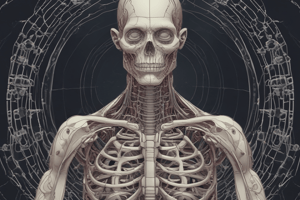Podcast
Questions and Answers
Which system is primarily responsible for protecting organs and producing blood cells?
Which system is primarily responsible for protecting organs and producing blood cells?
- Nervous System
- Digestive System
- Skeletal System (correct)
- Circulatory System
What is the main function of the muscular system?
What is the main function of the muscular system?
- Movement and posture maintenance (correct)
- Hormone regulation
- Nutrient absorption
- Gas exchange
Which system includes the brain and spinal cord for either sensory input or motor output?
Which system includes the brain and spinal cord for either sensory input or motor output?
- Immune System
- Nervous System (correct)
- Reproductive System
- Endocrine System
What is the primary role of the circulatory system?
What is the primary role of the circulatory system?
Which of the following systems is responsible for defending against infections?
Which of the following systems is responsible for defending against infections?
Flashcards
Skeletal System
Skeletal System
Provides structure and support for the body, protecting organs, producing blood cells, and storing minerals.
Muscular System
Muscular System
Responsible for movement of the body, including walking, talking, and even breathing.
Nervous System
Nervous System
Controls and coordinates all body functions by sending and receiving signals.
Circulatory System
Circulatory System
Signup and view all the flashcards
Respiratory System
Respiratory System
Signup and view all the flashcards
Study Notes
Major Body Systems
- The human body is a complex network of systems working together.
- Body systems include skeletal, muscular, nervous, circulatory, respiratory, digestive, endocrine, immune, integumentary, and reproductive.
Skeletal System
- Provides structure and support.
- Composed of bones, cartilage, and ligaments.
- Functions include protecting organs, producing blood cells, and storing minerals.
Muscular System
- Enables movement.
- Consists of skeletal, smooth, and cardiac muscles.
- Functions involve motion, posture maintenance, and heat production.
Nervous System
- Controls and coordinates bodily functions.
- Composed of the brain, spinal cord, and nerves.
- Functions encompass sensory input, processing, and motor output.
Circulatory System
- Transports blood, nutrients, and oxygen.
- Includes the heart, blood vessels, and blood.
- Functions include nutrient distribution, waste removal, and immune response.
Respiratory System
- Facilitates gas exchange.
- Includes lungs, trachea, and diaphragm.
- Functions involve oxygen intake and carbon dioxide release.
Digestive System
- Breaks down food for nutrient absorption.
- Composed of the mouth, esophagus, stomach, intestines, and associated glands.
- Functions encompass digestion, nutrient absorption, and waste elimination.
Endocrine System
- Regulates body functions using hormones.
- Consists of glands like the pituitary, thyroid, and adrenal glands.
- Functions control homeostasis, growth, and metabolism.
Immune System
- Defends against illnesses and pathogens.
- Includes white blood cells, lymph nodes, and spleen.
- Functions involve fighting infections and eliminating pathogens.
Integumentary System
- Protects the body from external harm.
- Comprises skin, hair, and nails.
- Functions include protection, sensation, and temperature regulation.
Reproductive System
- Enables the production of offspring.
- Involves male and female reproductive organs.
- Functions encompass gamete creation, sexual function, and hormone regulation.
Studying That Suits You
Use AI to generate personalized quizzes and flashcards to suit your learning preferences.



